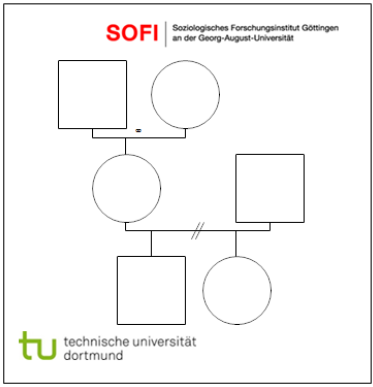Status maintenance in the ‘social middle’: intergenerational stability in occupational fields of the middle class
The research project investigates intergenerational strategies of status maintenance in three occupational fields of the middle class. Based on family interviews, different mechanisms of status reproduction are elaborated from an intergenerational perspective.
The project studies strategies and mechanisms of how the middle class maintains their intergenerational status within specific occupational fields. Numerous studies on social equality have already demonstrated that the middle class perceives itself as threatened by social insecurity and dynamics of social crisis.
The project firstly investigates the conditions of successful status maintenance. By which means and in what ways do families succeed to maintain their social status across several generations and thus simultaneously reproduce structures of social inequality.

Secondly, we put a special focus on the intergenerational relations: Under which conditions are which kind of mentalities, values, dispositions, and social positioning passed on or modified across generations in order to maintain the social status? The aim is to reconstruct the subjective perception of families an the - more or less – conscious, consensual or conflicting mechanisms which remain stable or change when comparing three generations across time.
Such mechanisms may go well beyond the important occupation-specific behavioral patterns such as investing into education. Thirdly, the project compares three typical occupational fields of the middle class: professions in (quasi-)government institutions, middle-class craftsmanship, and qualified employees in the technical field.
We thus combine sociological perspectives on social inequality and on work and professions and investigate occupational cultures as a central factor in families’ strategy of status maintenance. A more general inquiry on the making of societies is related to this: Are there occupation-specific mechanisms of status maintenance and which role to those occupation play with regard to the internal, both vertical and horizontal differentiation of the middle class?
Our research methods involve family interviews with members of three generations. Persons of the middle generations who work in one of the three professional fields named above are the anchor for recruiting further family members. This innovative approach offers the opportunity to analyze the collective production and ways of communication in families and directly relate them to the perspective of the individual. The sampling and data collection is based on the Grounded Theory Methodology. The empirical analyzes aims at developing a typology of cross-generational strategies of status maintenance.
Project duration
06/2018 - 12/2021 (42 months)
Project Team
Management | Prof. Dr. Nicole Burzan, TU Dortmund Prof. Dr. Berthold Vogel, SOFI Göttingen |
Employees | Dr. Miriam Schad, TU Dortmund Dr. Andrea Hense, SOFI Göttingen |
Publications
Hense, A. (2023): Combining Graphic Elicitation Methods and Narrative Family Interviews in an Embedded Qualitative Multimethod Design, In: Forum Qualitative Sozialforschung / Forum: Qualitative Social Research, Special Issue zum Thema “Mixed Methods and Multimethod Social Research – Current Applications and Future Directions”. [available online]
Schad, M./ Hense, A. (2023): Covid-19’s effects on strong and weak ties in middle-class families. Insights from intergenerational qualitative longitudinal data, Soziale Welt, SozW, 74 (1) 2023, 29 – 52 [available online]
Hense, A./ Schad,M. (2022): Intergenerationale Genese von Mentalitäten: Ein relationaler und längsschnittlicher Forschungsansatz der Bewusstseinsforschung. Arbeits- und Industriesoziologische Studien 15(1), S. 12-25. [available online]
Hense, A./Schad, M. (2021): Intergenerationaler Statuserhalt und berufsfeldspezifische Bildungsaneignung, In: Forum Erwachsenenbildung, 54. Jg., Heft 1/2021, S. 35-38.
Burzan, N. (2020): Kontinuitäten und Diskontinuitäten. Methodische Reflexion zeitsoziologischer Analysen in Mehr-Generationen-Familieninterviews [31 Absätze]. In: Forum Qualitative Sozialforschung / Forum: Qualitative Social Research 2020, 21(2), Art. 2 [available online] (also in english: Continuities and Discontinuities. A Methodological Reflection on Sociological Analyses of Time in Multigenerational Family Interviews. [available online in English]).
Burzan, N./ Kohrs, S./ Schad, M. (2019): Verunsicherung in den Mittelschichten? Konzeptionelle und methodische Erwägungen sowie empirische Befunde zur aktuellen Entwicklung in Deutschland. In: sozialpolitik.ch, Vol. 1/2019 („Erosion der Mittelschicht?“), Artikel 1.3. [available online]
Hense, A./ Schad, M. (2019): Sampling von Familien in der Mittelschicht. In Nicole Burzan (Hrsg.), Komplexe Dynamiken globaler und lokaler Entwicklungen. Verhandlungen des 39. Kongresses der Deutschen Gesellschaft für Soziologie in Göttingen 2018. [available online]
Schad, M./ Burzan, N. (2018): Von Generation zu Generation. Strategien des Statuserhalts im Kontext von Familien- und Berufsmentalitäten in der Mittelschicht. In: Schöneck, Nadine; Ritter, Sabine (Hg.): Die Mitte als Kampfzone. Wertorientierungen und Abgrenzungspraktiken der Mittelschichten. Bielefeld: transcript. S. 109‒123.
Schad, M./ Burzan, N. (2018): Intergenerationale Statusstabilisierung in der Mittelschicht – eine exemplarische Analyse zweier Unternehmensfamilien. In: WestEnd Neue Zeitschrift für Sozialforschung, 1/2018, S. 99-108.
Burzan, N. (2017): Zur intergenerationalen Stabilisierung der Zugehörigkeit zur Mittelschicht. Befunde aus einem Familieninterview und Schlussfolgerungen für soziologische Perspektiven auf soziale Ungleichheit, In: Stephan Lessenich (Hg.) 2017: Geschlossene Gesellschaften. Verhandlungen des 38. Kongresses der Deutschen Gesellschaft für Soziologie in Bamberg 2016.


![[Translate to English:] [Translate to English:]](/storages/zentraler_bilderpool/_processed_/b/9/csm_Spektralringe_225cc86301.jpg)
![[Translate to English:] [Translate to English:]](/storages/zentraler_bilderpool/_processed_/9/c/csm_Tisch-Laptops_ab150b7175.jpg)